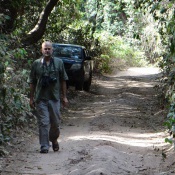The conservation status of the endangered African Wild Dogs in Angola: An historical and contemporary perspective
Historically, Angola was considered to have had one of the highest biodiversity indices in Africa. However, during the prolonged civil unrest, uncontrolled poaching of large mammals reduced wildlife populations to threshold abundance levels. Meanwhile the current status of the remnant biodiversity remains largely unknown including most of large carnivores such as the iconic and endangered wild dog. Apart from wildlife extirpation, civil unrest significantly contributed to the country’s insufficient number of qualified conservationist and wildlife managers. Nonetheless, the country still has large and remote areas of suitable habitat which may have retained high indices of biodiversity (species and community levels) particularly as local communities during the war abandoned their villages due to insecurity releasing human pressure from ecosystems. African wild dogs were formerly distributed throughout sub-Saharan Africa but have disappeared from much of their original range. As a result, is currently classified as Endangered, with a declining trend as a result of ongoing habitat fragmentation, conflict with human activities, and infectious disease. In Angola, wild dogs were historically reported seven of the country’s protected areas but decades of political unrest have prevented the collection of detailed and updated data on their population status and trends. However, in the last few years the presence of wild dog presence have been confirmed is some areas, including two National Parks: Bicuar NP located in SW Angola and Mavinga- Luiana NP located in SE and which represents the Angolan segment of the Kavango Zambezi Transfrontier Conservation Area. Overall objectives of this project are: 1) To determine the historical and current distribution of African wild dogs in Angola; 2) To determine population and ecological traits in two areas (Bicuar NP and Mavinga-Luiana NP); 3) To identify possible threats to wild dog survival, such as illegal mortality or exposure to infection diseases from domestic dogs, and 4) To train Angolan technicians and students on the use of modern techniques for wild dog survey and monitoring based on workshops organized in each study area; 5) Make management recommendations to the National Authority for Nature conservation.
Ezequiel Fabiano, Fernanda Lages, Larissa Bailey, Ivania Castro, Martha Alpheus, Maria Loa, Selma Kosmas

